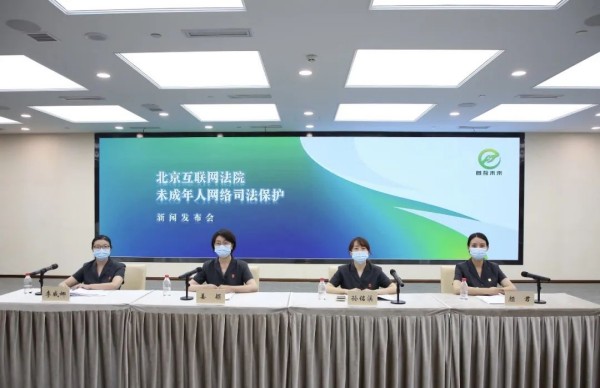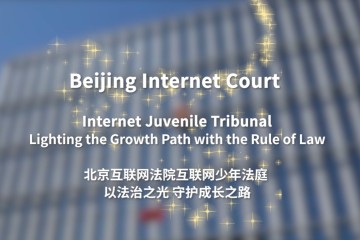BIC briefs cases on online protection of minors

The Beijing Internet Court holds a press conference on May 26 to brief on its trials on internet related cases concerning minors. [Photo/Beijing Internet Court]
The internet literacy of minors should be improved and their legitimate rights and interests on cyberspace to be strengthened as well, according to the cases tried by the Beijing Internet Court (BIC).
The BIC held a press conference on May 26 to brief on its trials on internet related cases concerning minors. Since its establishment in September 2018, the BIC has accepted 76 cases concerning minors in cyberspace disputes, among which, 60 of them were disputes on network service contracts, accounting for 79 percent of the total amount. Eight cases were about online rights infringement, and another 8 cases on network sales contract disputes, each accounting for 10.5 percent. Among the 63 cases that have been concluded, 74.6 percent were settled via mediation and rescinding in adjudication. The majority of the minor litigants were aged between eight and 16 years old; the youngest litigant was just five years old.
The BIC summarized the issues reflected by the cases and the reasons behind them at the conference.
Issues
- Supervision of minors' internet surfing is inadequate with severe internet addiction, especially in online gaming and livestreaming. Most minor litigants in these cases evaded family supervision and platform censoring by using their parents’ identities for registration and payment.
- Minors have little safety awareness on cyberspace and are vulnerable to harmful information, which led to economic losses as well as harm to their physical and mental health.
- Minors are both victims and perpetrators of personality rights violations. Cases heard by the BIC on personality rights infringement involving minors included online bullying, as well as the infringement of personal information and personal privacy. Online infringements were typically caused by offline conflicts, public incidents, and the negative impacts of fan culture.
- Minors are prone to impulsive consumption, typically in tipping livestreamers and purchasing items online that are beyond their needs.
Reasons behind
- Minors lack the awareness and ability to surf online in a scientific, civilized, safe and reasonable way. Their internet literacy should be improved.
- Parents and other guardians lack internet literacy themselves and had inadequate guidance and supervision for minors' online surfing behavior.
- Related market entities lack a comprehensive protection mechanism for minors and their content management needs to be optimized.
- Schools need to intensify education on internet literacy and students’ comprehensive development.
- Related departments need to improve regulations and responsibility clarification to better perform their duties in protecting minors.
- Furthermore, the social awareness of minors protection, especially in cyberspace, needs to be improved.

 Judicial White Paper
Judicial White Paper
 Play
Play Play
Play Online Lawsuit Guide
Online Lawsuit Guide Beijing Internet Court Lawsuit Service WeChat Account
Beijing Internet Court Lawsuit Service WeChat Account  Beijing Internet Court WeChat Account
Beijing Internet Court WeChat Account